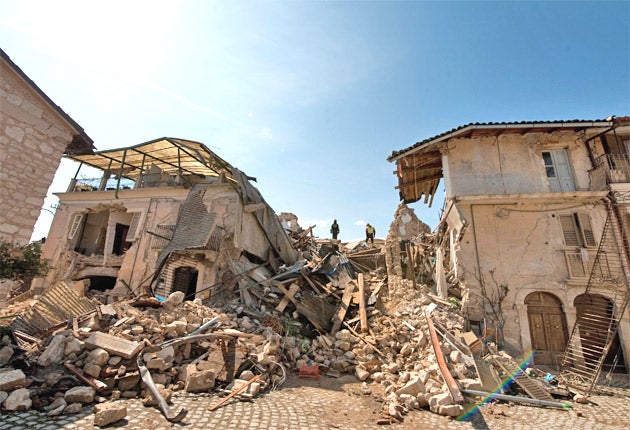Scientists go on trial for failing to warn public about L'Aquila quake

Your support helps us to tell the story
From reproductive rights to climate change to Big Tech, The Independent is on the ground when the story is developing. Whether it's investigating the financials of Elon Musk's pro-Trump PAC or producing our latest documentary, 'The A Word', which shines a light on the American women fighting for reproductive rights, we know how important it is to parse out the facts from the messaging.
At such a critical moment in US history, we need reporters on the ground. Your donation allows us to keep sending journalists to speak to both sides of the story.
The Independent is trusted by Americans across the entire political spectrum. And unlike many other quality news outlets, we choose not to lock Americans out of our reporting and analysis with paywalls. We believe quality journalism should be available to everyone, paid for by those who can afford it.
Your support makes all the difference.A group of Italian scientists went on trial yesterday accused of manslaughter for playing down the risks before an earthquake in L'Aquila in 2009 that killed more than 300 people and razed the medieval city to the ground.
Prosecutors say the six experts and one senior official should have warned people of the danger in the days leading up to the quake on 6 April, after earlier seismic activity. But the international scientific community has rallied around the Italian experts, arguing that they could not have predicted the 6.3-magnitude quake.
The seven include the prominent scientists Enzo Boschi, until recently the president of Italy's National Institute of Geophysics and Volcanology; and Claudio Eva, a physics professor at the University of Genova. They were members of a panel that had met six days before the disaster to assess risk after tremors had shaken the walled city.
At that meeting, the committee chaired by Franco Barberi of the Civil Protection Agency, concluded there was no evidence to suggest that a major quake was imminent, even though more than 400 low-magnitude shocks had occurred in the Abruzzo region in the previous four months. In one much-quoted interview, Bernardo De Bernardinis, then vice-chief of the technical division of the Civil Protection Agency, responded casually to a question about whether residents should just sit back and relax with a glass of wine. "Absolutely – a Montepulciano Doc," he replied.
Prosecutors say the panel gave overly reassuring information to local people, who might otherwise have taken steps to protect themselves. In the indictment, the seven are accused of "negligence and imprudence" and of having provided "incomplete, imprecise and contradictory information".
The scientists deny negligence. "You cannot put science on trial," Professor Eva's lawyer, Alfredo Biondi, told AFP. He also noted that during the meeting of the expert panel, his client had said "one cannot rule out a major quake".
And in a letter to President Giorgio Napolitano, more than 5,000 scientists from Italy and around the world said the defendants essentially faced trumped-up charges because it was impossible to predict with any accuracy, the time and location of earthquakes.
Rick Aster, the president of the Seismological Society of America, said: "Pursuing legal action against members of the seismological community after an earthquake is unprecedented and reflects a misunderstanding of the science of earthquakes."
The American Geophysical Union warned that the trial could hamper future research into earthquake risk. "Litigation will discourage scientists and officials from advising their government or even working in the field of seismology and seismic risk assessment," the organisation said.
But Vincenzo Vittorini, a doctor who founded the group "309 martyrs" after losing his wife and daughter in the disaster, said: "No one expected to be told the exact time of the quake. We just wanted to be warned that we were sitting on a bomb."
Many of the deaths were blamed on the collapse of buildings that had not been constructed to the standard required for such a quake-prone area. The next hearing is set for 1 October.
Join our commenting forum
Join thought-provoking conversations, follow other Independent readers and see their replies
Comments